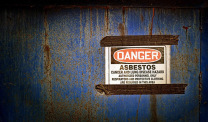Canada Announces Asbestos Ban with Exemptions
Asbestos Exposure & BansWritten by Tim Povtak | Edited By Walter Pacheco

The Canadian government released the final draft last week of its much-anticipated ban on asbestos use, making it illegal to import, manufacture, sell, trade or use products made with the toxic mineral.
The ban, which goes into effect Dec. 30, 2018, contains exemptions that still allow its use in the chlor-alkali industry, the military, nuclear facilities and for magnesium extraction from asbestos mining residue.
It will be known as The Prohibition of Asbestos and Products Containing Asbestos Regulations.
Canadian Environment Minister Catherine McKenna touted the tough new regulations during the announcement, but critics still condemned the exemptions.
They believe the ban is not strong enough and allows too many loopholes.
“I would give them credit for finally moving to ban asbestos, but I’m troubled by these weaknesses and gaps and, if anything, they seem to have gotten worse,” said Kathleen Ruff, Canadian human rights activist and board member of the Rideau Institute. “They seemed to have weakened their proposed regulations.”
A Much-Anticipated Ban
The announcement came almost three years after Canadian Prime Minister Justin Trudeau promised to push for a ban of asbestos, which once played a major role in the country’s economy.
The goal was to protect Canadian workers from the danger of exposure and eliminate the market for asbestos products. Canada was once a world leader in asbestos production.
“These measures will protect our communities and the health and safety of all Canadians,” McKenna said in her statement. “This is the final step to ban asbestos in Canada.”
The last asbestos mine in Canada closed in 2011, but several industries still use products containing asbestos.
Some have not found an easy replacement, which led to the exemptions.
Asbestos Once Widely Used in Canada
Asbestos is a naturally occurring mineral that was once used ubiquitously in manufacturing and construction. It was valued for its heat resistance and ability to strengthen almost anything with which it was mixed.
Its use declined steadily through the past few decades as the public became more aware of its health dangers.
The inhalation of asbestos fibers can lead to a number of serious health issues, including lung cancer, asbestosis and mesothelioma.
An estimated 3,000 people in the United States are diagnosed each year with mesothelioma. The Canadian government estimated that asbestos exposure was responsible for 1,900 lung cancer and 430 mesothelioma deaths in a single year.
Canada will join 62 other countries from around the world that have banned asbestos, according to the International Ban Asbestos Secretariat (IBAS), leaving more than 100 others that continue to use it.
It is still used legally — but sparingly, in a very restricted way — in the United States.
“None of these exemptions will impact human health — that is our top priority,” McKenna said last week. “In certain cases, there were technical reasons… for military facilities, you need to have exemptions, but these are time limited.”
Plenty of Exemptions to the Ban
There are several exceptions to the ban.
Nuclear facilities and the Canadian military will be able to import and use asbestos products to service equipment through 2029.
The chlor-alkali industry — where the majority of asbestos is used in the U.S. — can use it in Canada until 2030.
The industry uses asbestos-containing diaphragms to help contain explosions when making chlorine. Industry leaders told government officials they were unable to find a competitive alternative.
Part of the ban includes increased safety regulations for workers in the chlor-alkali sector.
Magnesium extraction companies will be permitted to work in the nearly 800 million tons of asbestos residue remaining near the mines in Quebec. The government already pledged $12 million to a company that developed a method for extracting magnesium, which will be sold to auto parts and aerospace manufacturers.
The use of road infrastructure containing asbestos also will be exempt from the ban and with no exemption or end date.
The ban also does not apply to structures or products that already contain asbestos, another reason many think the ban was not strong enough.
Asbestos in Canada still can be found in a wide variety of products, including building insulation, ceiling and floor tiles, automobile brake pads, cement and plaster products.
The regulations also allow for special permits to use asbestos products to “protect the environment or human health where there is no technically or economically feasible alternative.”
It Took Months for Final Approval
The regulations were originally proposed in January, but the government allowed several months of public input before the final draft was released.
Many of the exemptions were added after significant lobbying from various industries.
Sheri Benson, from the Canadian House of Commons, spoke out against the new regulations last week because of the exemptions.
Benson called the ban a “watered down version” of what she wanted.






